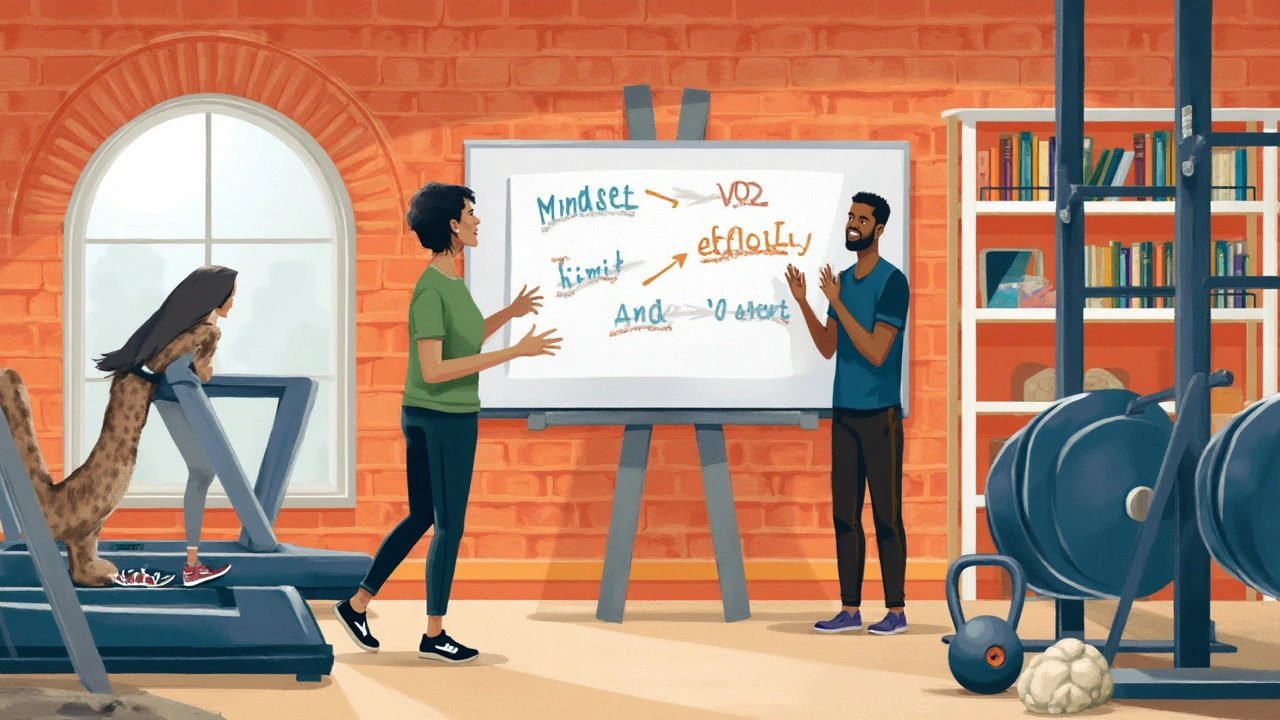You feel it on the commute, in the gym, and in those quiet moments before a tough conversation: the private story you tell yourself shapes what you actually do. The question is not whether mindset matters, but how much-and how to use it without falling for clichés. Here is the honest answer, grounded in research and built for daily life.
What follows is a clear review of the evidence, the limits, and a simple routine. No slogans. Just practical tools that steady your head and move your feet.
Jobs to be done (what you likely came here for):
- Get a straight, science-backed answer to whether mindset changes real outcomes.
- Know which beliefs matter most for performance, health, and relationships.
- Learn a simple, repeatable way to build a resilient mindset without the fluff.
- Spot and fix the thinking traps that derail execution.
- Leave with a checklist, examples, and answers to common doubts.
What the science really says (and what it doesn’t)
TL;DR
- Mindset influences effort, strategy, and persistence; those shape results. It’s a lever-small to moderate in size-but compounding.
- Beliefs like self-efficacy, locus of control, and a growth mindset correlate with better performance and wellbeing in many settings.
- Interventions work best when they are targeted, short, and paired with real opportunities and skills. They aren’t magic.
- Context matters. Systems, coaching, sleep, and skill practice often amplify any mindset shift.
Let’s make terms precise so we’re not arguing with shadows:
- Growth vs fixed mindset (belief about whether abilities can be developed). Classic work by Carol Dweck; effects exist but are context-sensitive and often modest.
- Self-efficacy (belief in your ability to execute a specific task). Consistently linked to performance across many domains.
- Locus of control (seeing outcomes as influenced by your actions vs fate). Tied to job performance, health behaviors, and satisfaction.
- Explanatory style/optimism (how you explain setbacks). Linked to resilience, health, and persistence.
Credible highlights worth knowing:
- Large studies on growth-mindset interventions in schools show small but meaningful gains, especially for lower-achieving students and in supportive environments (Yeager et al., Nature, 2019; Sisk et al., Psychological Science, 2018).
- Meta-analyses show self-efficacy relates to work performance at roughly moderate strength (Stajkovic & Luthans, Organizational Behavior and Human Decision Processes, 1998; Judge et al., Journal of Applied Psychology, 2007).
- Internal locus of control associates with better job performance and satisfaction (Ng, Sorensen, & Eby, Psychological Bulletin, 2006).
- Reappraisal (changing how you interpret stress) links to better emotional outcomes (Aldao, Nolen-Hoeksema, & Schweizer, Clinical Psychology Review, 2010).
What does that mean in plain English? Mindset doesn’t hand you promotions or a faster 10K. It nudges the behaviors that make those more likely-showing up, persisting a bit longer, choosing a better strategy, asking for feedback, calibrating effort when it counts. Small gains, repeated, compound.
Useful rule of thumb: mindset is an amplifier, not a replacement. If skill, strategy, and opportunity are weak, mindset can’t carry the load. But when you pair a constructive belief with training, sleep, and a sensible plan, performance moves.
Two fast formulas to keep in your pocket:
- Outcome ≈ Skills × Effort × Strategy × Opportunity × Time. Mindset biases your effort and strategy, often the parts you control daily.
- If a belief causes you to skip a key behavior, it’s an expensive belief. Change that belief first.
| Domain | Mindset Variable | Representative Source | Design/Scope | Typical Effect | What It Implies |
|---|---|---|---|---|---|
| Education | Growth mindset | Yeager et al., Nature (2019) | National field experiment | Small, context-sensitive gains | Helps most with support and actionable challenges. |
| Work performance | Self-efficacy | Stajkovic & Luthans (1998) meta | 114 studies | Moderate correlation | Belief in task ability nudges execution quality. |
| Career outcomes | Locus of control | Ng et al., Psych. Bulletin (2006) | Meta-analysis | Small-moderate links | Seeing agency supports proactive behavior. |
| Emotion regulation | Reappraisal | Aldao et al. (2010) meta | 114 studies | Adaptive associations | How you frame stress affects resilience. |
| Health behavior | Self-regulation beliefs | Burnette et al., Psych. Bulletin (2013) | Meta-analysis | Small-moderate links | Beliefs guide goal setting and follow-through. |
So yes, mindset affects life-measurably. Not as a silver bullet, but as a daily steering wheel. You still need a well-tuned engine.

The practical build: a simple routine for a stronger mindset
You do not need mantras or a vision board. You need a light set of practices that fit a busy calendar and pay off in better decisions and steadier effort.
Audit your default story. For one week, write down the moment you avoid action. Note the thought just before you hesitate. Common scripts: “If I can’t do it perfectly, I won’t start.” “I’m not a numbers person.” “Networking is fake.” Awareness is leverage.
Replace with if-then plans. Link beliefs to behaviors. “If I feel underprepared, then I will do one 25-minute focused block.” “If I get vague feedback, then I will ask one clarifying question.” Implementation intentions turn mindset into movement.
Use a 2×2 reframe. When stress hits, ask: is this high or low importance? Is it in my control or not? Do one small step for high-importance/in-control tasks; schedule a review for high-importance/out-of-control; automate or ignore the rest. Control first. Emotion follows.
Run a weekly “evidence scan.” On Friday, list three moments where effort improved the result, even slightly. The brain updates beliefs when it sees proof. Keep the list short and specific: “Sent the awkward email, got the data I needed.”
Design friction and fuel. Make the right action easy, the wrong action harder. Gym kit next to the bed. Calendar blocks for deep work. Phone on flight mode during your first 90 minutes. Belief thrives when the path is clear.
Seek one edge: skill + feedback. Pick a single skill that improves your outcomes this quarter (e.g., concise writing, negotiation basics). Practice twice a week. Ask one person for specific feedback each month. Confidence withers without mastery.
Daily micro-routine (15-20 minutes total):
- Two-minute priming: “What is the most valuable action I can complete today?” Write it. Circle it.
- One 25-minute block on that task before email or news.
- One reframe: when stress hits, name the task, name the fear, choose the smallest step.
- Evening two-line reflection: What worked? What will I repeat tomorrow?
Weekly cadence (30-40 minutes):
- Review the evidence scan. Update one belief if the data contradicts the old story.
- Plan two high-leverage blocks for the coming week on your chosen skill.
- Set a boundary for one energy drain (late-night scrolling, unnecessary meetings). Protecting energy is a mindset in action.
Heuristics to keep you honest:
- “Proof, not pep talks.” Log behaviors, not feelings.
- “Default to action under uncertainty.” A small step beats rumination.
- “Ask for the ugly truth.” A direct critique is worth five compliments.
- “Progress over pride.” Choose the next useful step, not the glorious one.
Common mistakes to avoid:
- Chasing motivation. Build systems that make the right action automatic.
- Overgeneralising failures. Keep setbacks specific and time-bound.
- Ignoring sleep and training. A tired brain sees threats everywhere.
- Confusing positivity with strategy. Optimism without a plan is just mood.

Examples, checklists, and the questions men actually ask
Three real-world scenarios:
- Career: asking for a raise. Old script: “If I ask, they’ll say no.” New approach: gather three clear wins (revenue saved, revenue brought in, risk reduced), rehearse the ask, propose a range, and schedule the conversation. If-then: “If the answer is not now, then I ask what specific targets unlock a yes.”
- Fitness: restarting after a hiatus. Old script: “I need a perfect plan.” New approach: three sessions a week, 45 minutes, full-body basics. If-then: “If I miss a session, then I train the next day with half volume.” Skill edge: learn one lift well, log it, and progress slowly. London tip: book sessions near your commute to reduce friction.
- Relationships: difficult conversation at home. Old script: “It’ll start a fight.” New approach: state your intent (“I want us to manage money better together”), share the data, ask one open question, agree on a next step. If-then: “If voices rise, then we pause for 10 minutes and return.”
Mindset cheat sheet (print this):
- When I notice: “I don’t feel ready.” I will do: one 25-minute starter block.
- When I get vague feedback. I will ask: “What would great look like here?”
- When a plan slips. I will schedule one recovery session within 24 hours.
- When anxiety spikes. I will breathe 4-6, name the task, pick the smallest next step.
- When self-doubt grows. I will review my evidence scan and one recent win.
Decision tree for mindset vs reality:
- Is the barrier skill? Train twice weekly; ask for a resource; book a short course.
- Is the barrier time/energy? Remove one low-value commitment before adding anything new.
- Is the barrier fear of judgment? Run a low-stakes test; ask one trusted person for feedback.
- Is the barrier genuine lack of opportunity? Expand your surface area: three new conversations a week for a month; update your portfolio/CV; define your target list.
Mini-FAQ
- Isn’t this just positive thinking? No. This is evidence-driven: beliefs that trigger specific behaviors, measured weekly. Positivity is optional; execution is not.
- What if my environment is the main problem? Then you work two fronts: change what you can inside the environment (skills, allies, systems) and change the environment itself over time (role, team, firm). Mindset helps you take those steps sooner.
- How fast can beliefs change? Often within weeks when paired with proof. One or two visible wins accelerate the shift.
- Do affirmations work? Only if anchored to action. “I am confident” changes little; “I will ask one clarifying question in the 10:00 meeting” changes behavior.
- Can I be too resilient? Yes. Persistence is not wisdom. Reassess monthly: if returns stay flat and costs grow, pivot.
A gentleman’s checklist
- Clarity: one most valuable action per day, written before email.
- Control: if-then plans for your top three derailers.
- Cadence: two deep-work blocks per week on a skill that pays the next raise.
- Care: 7-8 hours of sleep, protein at breakfast, 10 minutes of daylight before screens.
- Character: ask for tough feedback monthly; thank the person who gives it.
Pro tips from the field:
- Make it visible. Put your weekly evidence scan on your desk. Seeing progress keeps belief alive.
- Anchor to identity. “I’m the man who keeps promises to himself.” Then keep them small and specific.
- Borrow courage. Commit publicly to a training block or presentation date. A bit of social pressure helps.
- Respect seasonality. During heavy travel or family demands, protect the minimums: sleep, two workouts, one deep-work block. Consistency beats intensity.
Troubleshooting by persona
- Busy executive. Problem: calendar chaos. Fix: one 90-minute weekly strategy block; delegate one task weekly; turn big goals into weekly leading indicators (calls made, proposals sent).
- New father. Problem: erratic sleep. Fix: consistent bed/wake windows where possible; brief garage-style workouts; lower targets but protect frequency. Identity: present partner, reliable provider, steady learner.
- Mid-career pivot. Problem: uncertainty. Fix: informational interviews (3 per week for 4 weeks), portfolio of small bets, one skills sprint (6-8 weeks). Replace “I need certainty” with “I need data.”
- Fitness restart at 40+. Problem: soreness and time. Fix: full-body twice weekly, daily walks, mobility in the evenings. Aim for consistency, then add intensity.
A note on London pragmatism: if your mornings vanish to the Tube and early calls, make the commute work for you-audio learning, review notes, or simply breathing and planning the day’s one decisive action. A stable mind in a moving city is an edge.
One last thought: the best mindset work is quiet. It shows up as punctuality, clean execution, well-chosen battles, and follow-through. People notice. Opportunities find the man who keeps moving.

